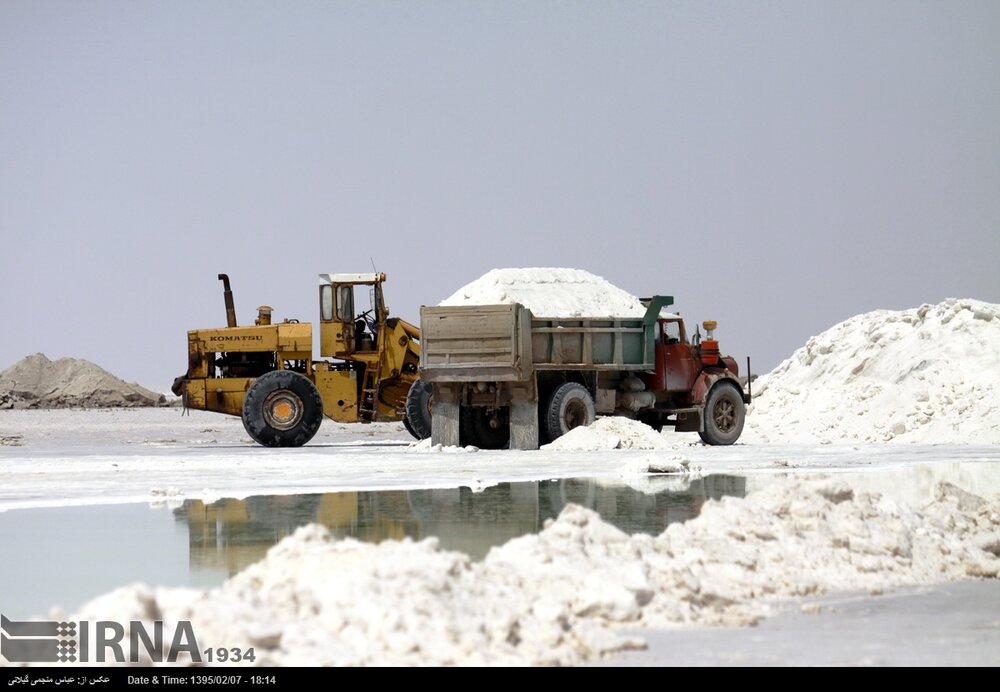Salt harvesting; a way of survival for Lake Urmia

TEHRAN – The results of recent studies showed that salts encrusted the Lake Urmia’s bed are required to be extracted to prevent from reduction of water level and becoming a salt flat, deputy chief of the Department of Environment (DOE), Masoud Tajrishi, has said.
Lake Urmia, in north-western Iran, was twice as large as Luxembourg and the largest salt-water lake in the Middle East. The volume of water at the lake measured at 30 billion cubic meters in 1997. However, after 2 decades, the water level has drastically decreased to only 2.5 billion cubic meters.
Low precipitation rate, water resources mismanagement and inefficient agricultural methods are believed to be the main culprits for converting the so-called “turquoise solitaire” to a partially dry and white surface.
“Studies conducted by a group of foreign researchers in cooperation with the Ministry of Energy have shown that since the next 500 years, Lake Urmia will be a playa (dry lake) and turns to a salt flat,” Tajrishi stated.
A dry lake (or playa Spanish word) is formed when water from rain or other sources, like intersection with a water table, flows into a dry depression in the landscape, creating a pond or lake. If the total annual evaporation rate exceeds the total annual inflow, the depression will eventually become dry again, forming a dry lake. Salts originally dissolved in the water precipitate out and are left behind, gradually building up over time. If the floor of a dry lake is covered with salt, it is known as a salt flat.
“In the last few years, due to shrinking water level in Lake Urmia, its bed generally encrusted with precipitated salts, so salt harvest will not interrupt the restoration programs, but helps to revive the lake,” Tajrishi added.
He went on to say that accordingly, salt mining is possible in case the DOE issue a permit, while withdrawal must be carried out on designated locations in order not to bring irreparable damages to the lake.
All the lakes in the world have an average lifespan, in fact, the current lakes were once a sea, for example, the Caspian Sea and Lake Van were connected thousands of years ago, but the water was gradually shrinking and led to their separation, he explained.
Geologically, all the lakes will dry up in the future, and with restoration measures, we try to make their life time longer, he regretted, IRNA reported on Wednesday.
Of course, all these measures should be fully scientific and environmentally assessed, he noted, adding that one of the proposed tasks to save Lake Urmia was water transfer from the Caspian Sea, which was canceled because the life of the lake would have been shortened for 50 years due to leaving great salt reserves in its bed.
Water levels has also increased by 1.08 meters compared to the corresponding period last year, he said, adding that water amounting to 5.19 billion cubic meters is now covering some 3,200 square kilometers of the lakebed.
Salt reserves in Lake Urmia’s bed is so vast that every human on earth can have more than a 1-tone share from it, said Tajrishi, IRNA reported in November 2015.
Iran’s Geological Survey & Mineral Explorations Organization has been tasked to devise a comprehensive and scientific plan for efficient and standard exploitation of salt form the lake, he added.
Also in October 2017, when attending a meeting with representatives of mining companies, Tajrishi again touched on the great potential of salt mining in Lake Urmia and called for taking more serious action in this regard.
The thickness of salt varies between 0.5 to 4 meters, said Naser Aq, deputy director of Lake Urmia Research Institute, affiliated to Urmia University, IRIB reported in October 2017.
Gradually these salt sediments turn to salt stones which are one of the barriers to Lake Urmia’s restoration, he said, adding that even few millimeters of precipitation will stand above these salt stones and create the illusion that the lake has been revived.
Lake Urmia’s salt is a great opportunity for creating jobs as well as growing the economy of the region, the same report quoted MP Nader Qazipour as saying.
FB/MG
Leave a Comment